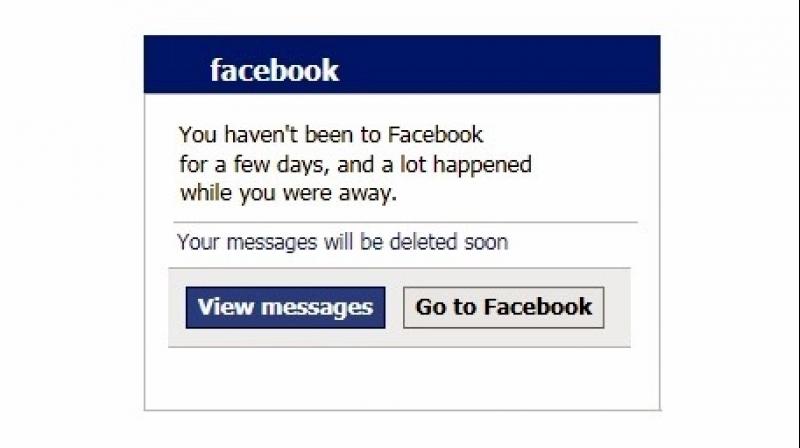New scam: Email from Facebook' claims your messages will be deleted'
A new method adopted by scamsters is an email from Facebook' which forces unsuspecting victims to click on the link in the message.

Email scams are not new, and many emails are camouflaged with familiar looking messages, that can easily trick the user into believing and clicking on them. The main tricks used are curiosity, offers and panic. Similar is the case with a new type of email scam, which tricks users into believing that Facebook has sent an email with a message that the social media company will delete all the user’s messages since you haven’t checked them out for long.
Yes, we live in a world where smartphones are the primary source of our internet feed and most of our work and pleasure happens on the little glass display. Apps rule our world and we almost never use our good old PCs for social media anymore. Apps don’t give out complete information as desktop browsers do — all ‘no-thanks’ to that tiny display in your palm that needs to show important stuff, large enough to read, but all cramped into a tiny area. This makes it difficult for a person to know other important areas such as basic notifications, messages and alike. All you may see is a tiny dot or a number over a small icon in the topmost cornet of your screen, which is hardly visible since you are more interested in the large content area in the centre of the screen.
Taking advantage of these ignored features, scamsters seem to be gaining higher ground by scamming unaware victims.
In a new incident, an email came in which claimed to be a notification from Facebook. The subject line read ‘Your messages will be deleted soon baird.’ Well, it did end up in my spam email, but the subject line did make me curious as to why would a Facebook message go into spam?
On analyzing the same, as usual, I opened it on my Gmail app, only to find out that the message was well camouflaged with a Facebook theme and font. The message in the body stated that ‘You haven’t been to Facebook for a few days, and a lot happened while you were away. Your messages will be deleted soon.’ Below the themed message window were two icons to ‘view the message’ and ‘go to Facebook.’ Apart from this, the footer on the email also looks like the genuine message footer from Facebook. It stated, ‘This message was sent to asdsicnarf@gmail.com. If you don't want to receive these emails from Facebook in the future, please unsubscribe. Facebook, Inc. Attention: Department 415 P.O Box 10005 Palo Alto CA 94303.’
Do note that the messages to be deleted text, the two buttons and the unsubscribe text were all hyperlinked, leading to a website outside the mail box.
This could not be happening since most of our day usually goes checking out our Facebook timeline and we definitely don’t skip any messages. However, an unsuspecting victim would curiously click on the links (buttons) to know what messages are in store are for him, and check them out before it is ‘deleted by Facebook.’
Once clicked, the link takes you to a shopping website. The scamster’s work is done here. He has managed to trick you into viewing an ad, landing up on a website, that in turn pays him for each click and view. Victims who click it might think it was an error and try again. The same thing happens. Then he tries clicking on the other links too, which takes him to the same website, but different pages each time — the scamster wins again — he made a few cents off your click. Now imagine if this message sent by him around the world accounted in big numbers. He gets free money y simply tricking you into visiting the website for him.
In all this, you may have lost just a little amount of your internet data bandwidth. You may have probably even found out that the message was a fake, and finally deleted it or marked it as spam too. However, you should be careful too — the websites you end up on could be filled with malware. If redirected from a desktop PC, your system could be infected.
Fake, scam and spam emails are a norm today and most AI filters on email systems usually track down such emails to protect their users from malware, attacks and phishing websites.
Before you open any such message, take some time to analyse the email. Check from where it has come, what is the email address mentioned and check the links before you click on them. Right click on the link and paste it on your notepad, or simply hover your mouse on the link and check the bottom of your browser which shows you the url hyperlinked. In this case, the email came in from an email address ‘esoyaa@proctors.org’ and the hyperlinked texts and buttons were redirecting to a website ‘ladiscotek.com,’ which is a website for Forskolin Extract, a weight loss solution cream.
 The message link takes you to a website that has an article written for the weight loss cream.
The message link takes you to a website that has an article written for the weight loss cream.



